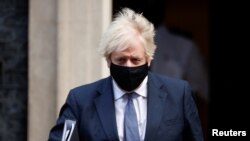British Prime Minister Boris Johnson told parliament Wednesday that the government had "no choice but to return to a national lockdown," as health officials estimate that one in every 50 people in the nation have had COVID-19 in the last week.
Figures released Tuesday by Britain’s Office for National Statistics show the number is higher in London, where one in 30 people had the virus between December 27 and January 2. The figure does not include people in hospitals, nursing homes and other institutions.
Addressing parliament Wednesday ahead of lawmakers’ retroactive votes on lockdown measures introduced earlier this week, Johnson said the plan is for the lockdown to last until the end of March, but with a mid-February review.
He said the lockdown is an effort to slow the spread of the virus while the country is accelerating its vaccination program.
Under the latest lockdown, schools, outdoor sports facilities, bars, restaurants, hair salons, gyms, theaters and most shops are closed.
Johnson said 1.3 million people have received at least one shot of the two-dose inoculation regime since injections began in early December. That includes almost a quarter of people over the age of 80.
Comparing the vaccination effort to a race, Johnson said after the “marathon of last year, we are now in a sprint …to vaccinate the vulnerable faster than the virus can reach them.”
New COVID-19 infections have soared in recent weeks as public health officials struggled to contain a new variant that the government says is 50% to 70% more contagious.
Britain reported 830 coronavirus-related deaths on Tuesday. The death toll from the pandemic is now 76,423, one of the world's highest tallies, according to data from Johns Hopkins University.






